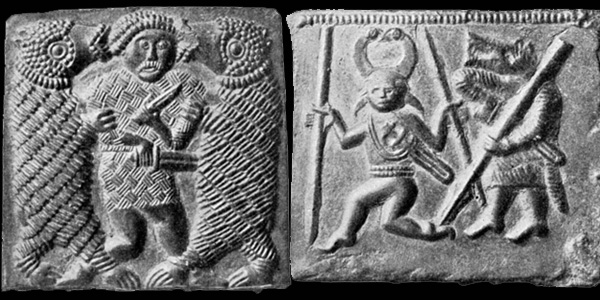
March 11, 2014, by Guest blog
The Viking Berserker
This blog post was written by PhD student Ruarigh Dale, who has just submitted his PhD theory on this topic.
The meaning of berserkr
Publicity for the current Viking exhbition at the British Museum invites potential visitors to ‘go berserk’. The meaning of modern English ‘berserk(er)’ can be traced to the thirteenth-century Icelander Snorri Sturluson, who wrote that Odin’s men went into battle without armour and were as mad as dogs or wolves, creating an image that has followed berserkers ever since (Ynglinga saga, ch. 6). The Oxford English Dictionary will tell you that a ‘berserker’ is ‘a wild Norse warrior of great strength and ferocious courage, who fought on the battle-field with a frenzied fury known as the berserker rage’, and defines ‘berserk’ as ‘frenzied, furious or madly violent’. Both ‘berserk’ and ‘berserker’ derive from Old Norse berserkr (plural berserkir), which described a particularly fierce type of warrior. However, the meaning of berserkr is not as clear as its English derivatives make it seem. Certainly these warriors were deemed to be fierce and uncontrollable in the medieval period, as Snorri’s description indicates. However, berserkr is also used in a number of other contexts which suggest that the medieval meaning was more complex than the modern meaning of ‘berserker’, as the roles performed by berserkers in the sagas show.
The berserker of Old Norse literature fulfilled several roles. In the legendary sagas (fornaldarsögur) the berserker was a dangerous but valued member of a lord’s personal retinue, who might also go on raiding voyages, thus becoming a pirate. They also sometimes functioned as hall-challengers, a role which saw them challenging everyone in the hall until one person stood up to them and defeated them. This last role has been interpreted as an initiation or rite-of-passage into the warband for the challenged party. The berserkers of Hrolf kraki did all of these things according to Hrólfs saga kraka and Snorri Sturluson in his Edda. In the sagas of the Icelanders (Íslendingasögur) they are usually depicted as bullies, who use legal means to challenge innocent farmers to duels (Old Norse holmganga) for their wives, daughters and / or farms. While the duels appear to have legal substance, the berserkers are not welcome and it is the duty of the hero of the saga to defeat them as Egil does to both Ljot the Pale and Atli the Short in Egils saga. Like the hall-challengers, some of these duelling episodes have been interpreted as initiation rituals, because the hero is often treated poorly before the duel and becomes accepted afterwards.
These roles shed greater light on the meaning of berserkr than its etymology, which either means ‘bare-shirt’ or ‘bear-shirt’. That is, they either did not wear armour, or they wore bearskins. However, neither etymology means that they fought naked. It seems more likely that ‘bear-shirt’ was the original etymology, because of the connection with bears that features in many sagas, but both could have arisen separately in different areas and been conflated at a later date. As a result we would be totally reliant upon the roles depicted in the sagas to understand the meaning of berserkr, were it not for a translation of Chretien de Troyes’ Yvain, le Chevalier au Lion (Yvain, the knight with the lion). This was translated as Ívens saga in the thirteenth century for the Norwegian king Hákon Hákonarson, and the Old French chanpion (champion) was translated as berserkr. In this context it was used to describe someone who fought in a duel on behalf of someone else. This fits well with their depiction as duellists and members of a king’s retinue in the sagas. The bullying berserkers of the sagas of the Icelanders also fought duels, although on their own behalf, so ‘champion’ can still be an appropriate translation. Their role as pirates does not seem appropriate to champions, but this type of piracy is a product of the warband economy which required a constant influx of treasure for kings to gift to their followers. Therefore, berserkers could still be champions while also undertaking raiding voyages, but not being specifically defined by them. Thus, it is probable that modern English ‘champion’ gives a better sense of how saga authors understood berserkr and is its core medieval meaning.
No comments yet, fill out a comment to be the first

Leave a Reply